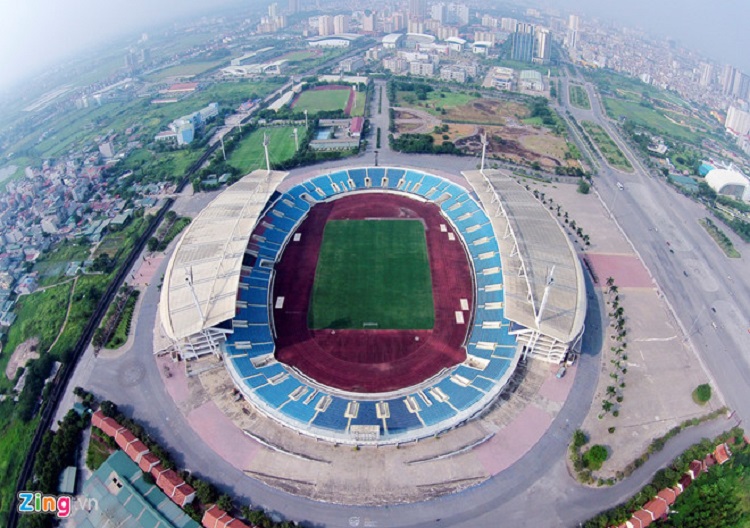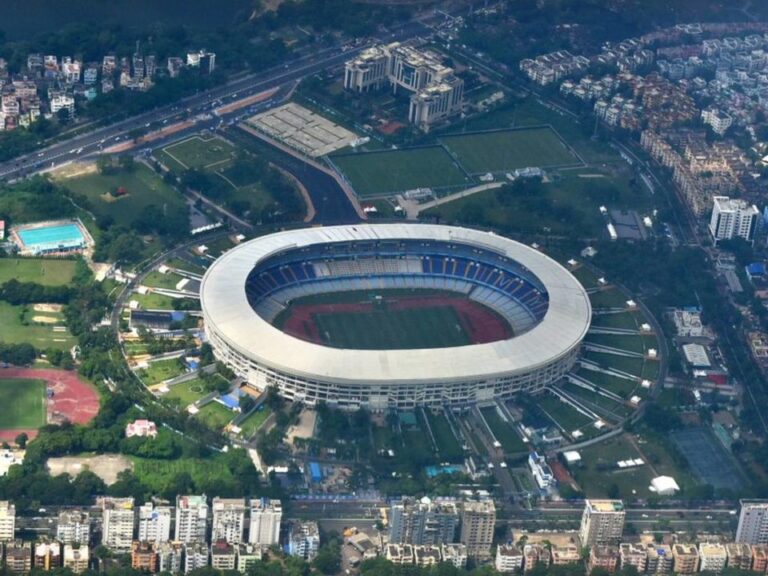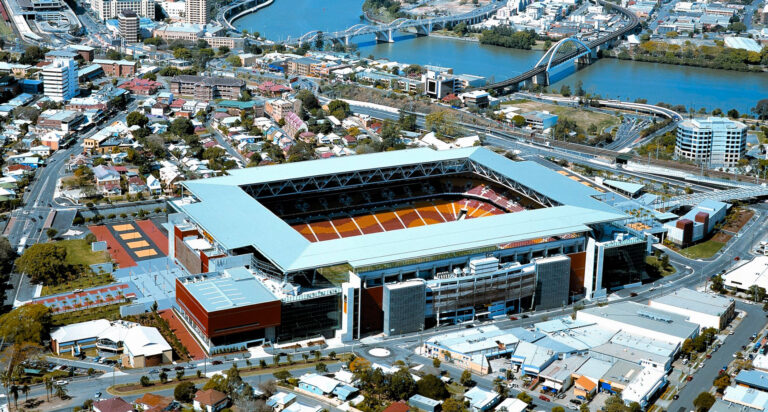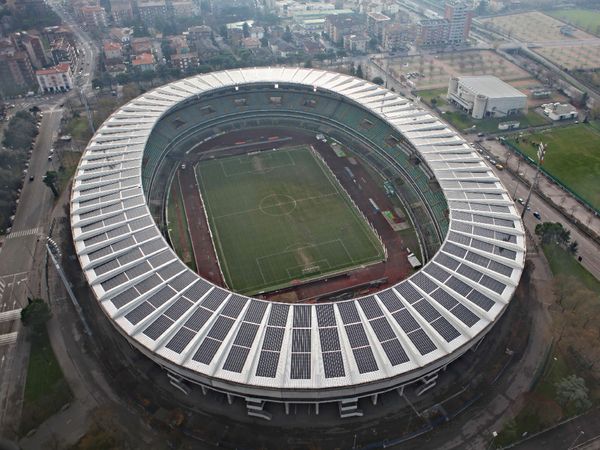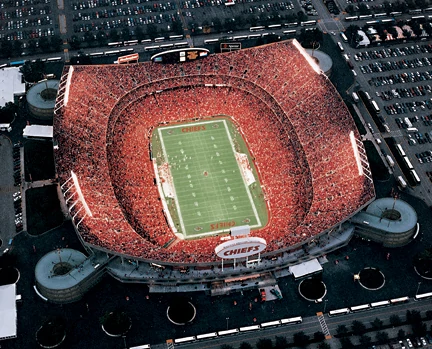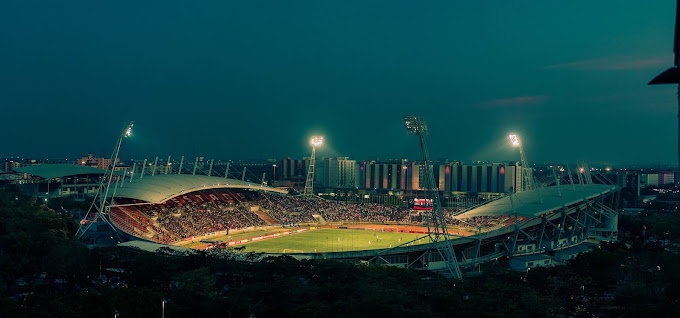Gillette Stadium Capacity, Tickets, Seating Plan, Records, Location, Parking
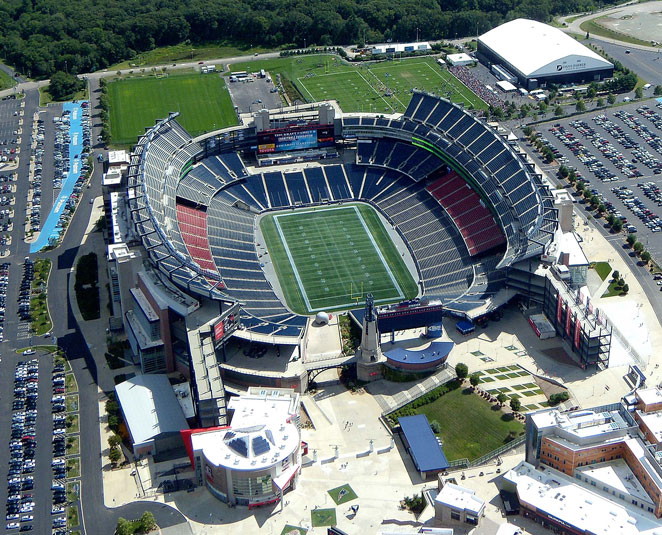
Gillette Stadium is a multi-use stadium in the city of Foxborough, Massachusetts, which is 22 miles (35 km) southwest of downtown Boston. It serves as the home stadium and administrative office for both the New England Patriots of the National Football League (NFL) and the New England Revolution of Major League Soccer (MLS).
It opened in 2002, replacing the adjacent Foxboro Stadium. It also served as home to the University of Massachusetts (UMass) Minutemen football team in 2012 and 2013, while the Warren McGuirk Alumni Stadium on campus underwent renovations; it continued to serve as the part-time home venue for the highest-attended UMass games through 2018. Gillette Stadium’s seating capacity is 65,878, including 5,876 club seats and 89 luxury suites.
The Town of Foxborough approved plans for the construction of the stadium on December 6, 1999, and work on the stadium began on March 24, 2000. The first official event at the stadium was a New England Revolution football game on March 11. on May 9, 2002. Jeremiah Freed was the opening band at the WBCN River Rave on June 9, making them the first band to play the stadium. Groundbreaking ceremonies were held on September 9, when the Patriots unveiled their Super Bowl XXXVI championship banner before a Monday Night Football game against the Pittsburgh Steelers.
The stadium was originally known as CMGI Field before Gillette bought the naming rights after the dot-com bankruptcy. Although Gillette was acquired by Procter & Gamble in 2005, the stadium retains the Gillette name. In September 2010, Gillette and the Patriots announced that their partnership, which includes the stadium naming rights, would run through the 2031 season. Additionally, uBid (a wholly owned subsidiary of CMGI until 2003) continues to sponsor one of the major entrance gates to the stadium as of 2009.
Gillette Stadium is accessible by train via the Providence/Stoughton and Franklin lines at the Foxboro MBTA station, but only during Patriots games and some concerts. The Patriots have sold out every home game since moving into the stadium: preseason, regular season, and playoffs. This streak dates back to the 1994 season at Foxboro Stadium; as of September 2016, it had reached 231 games.
The stadium is owned and operated by Kraft Sports Group, a subsidiary of Kraft Group, the company through which businessman Robert Kraft owns the Patriots and Revolution.
The stadium will host several matches during the 2026 FIFA World Cup.
| Built In: | March 24, 2000 |
| Capacity: | 65,878 |
| Home Teams: | New England Patriots |
| Ground Size: | 120 yd × 53 1/3 yd |
Gillette Stadium History
Foxboro Stadium
From 1971 to 2001, the Patriots played all of their home games at Foxboro Stadium. The stadium was privately financed on an extremely small budget and featured few amenities. Its aluminum benches would freeze during cold-weather games and it had a disorganized dirt parking lot.
Foxboro Stadium did not generate the profits needed to support an NFL team in New England; with just over 60,000 seats, it was one of the smallest stadiums in the NFL.
In 1984, team executive Chuck Sullivan financed the Victory Tour of The Jacksons, in an attempt to make more profit for the team. However, ticket sales failed and the team’s debt increased further, to a final total of $126 million. After two unsuccessful owners purchased the team and stadium, it became clear that a new stadium had to be built for the team to stay in New England. This was when other cities in the New England area, including Boston (formerly home to the Patriots), Hartford, and Providence became interested in building new stadiums to draw the Patriots away from Foxborough.
Location discussions
The first major stadium proposal from another city came in September 1993. Lowell Weicker, the Governor of Connecticut, proposed to the Connecticut General Assembly that a new stadium be built in Hartford to entice the Patriots to move there, stating that a stadium had “potentially great benefit” if it were built. The bill was passed in the State Assembly on September 27, 1993.
Back in Massachusetts, there was a proposal to build a “Megaplex” in Boston, which would be the site of the stadium, as well as a new Fenway Park (the home park for the Boston Red Sox) and a convention center. Proposed sites for this stadium-hybrid convention center were either along Summer Street in South Boston or at the so-called Crosstown site along Melnea Cass Boulevard in Roxbury, adjacent to Boston’s South End.
Massachusetts Governor William Weld’s administration pushed for the construction of an entire “Megaplex” on the site of the city’s junction, and Boston’s then-new mayor Thomas Menino favored the construction of a new free-standing convention center in South Boston. Ultimately, the residents of neither of these neighborhoods wanted a stadium, and as a result, Menino backed out, fearing it would affect his re-election chance. The Fenway Park plan was canceled after many “Save Fenway Park!” groups arose to save the historic stadium.
Kraft then began a plan to build a new stadium in South Boston. In that plan, Kraft was to pay for the stadium himself, hoping to win the support of Weld and Menino. He began sketching designs, but the project was leaked to the press in December 1996. South Boston residents objected to a stadium being built on the site, causing Menino and Weld to fall out with Kraft. Kraft dropped all plans for a Boston stadium after the affair.
In January 1997, Kraft began talks with Providence mayor Vincent Cianci to move the team to Providence and build a new stadium there. The proposed 68,000-seat domed stadium would have cost $250 million and paid for through income taxes, public bonds, ticket surcharges, and private funds. Residents of the proposed project neighborhood were extremely opposed to the project because the surrounding area would have needed massive infrastructure improvements. The proposal fell through after a few weeks.
During a press conference in September 1998, the team revealed plans to build a new stadium in Foxborough, while keeping the team in Massachusetts. It was going to be financed by the state and by Kraft itself. This plan brought more competition from Connecticut, such as a billion dollar plan to renovate an area of Hartford, including building a stadium. Kraft then signed an agreement to move the team to Hartford on November 18, 1998. The proposed stadium included 68,000 seats, 60 luxury boxes, and had a projected cost of $375 million.
As before in Boston and Providence, residents questioned the construction of the stadium. Problems with the site were discovered and an agreement could not be reached on the details of the stadium. The entire plan ultimately failed, angering then-Connecticut Governor John G. Rowland, who lobbied heavily for the stadium and spent weeks deliberating with Robert Kraft. Rowland announced at a press conference that he was official “a fan of the New York Jets, now and probably forever.” In 1999, the team officially announced that it would remain in Foxborough, which led to the construction of Gillette Stadium. After the Hartford proposal failed, Robert Kraft paid 100% of the construction costs, a rare case where an NFL owner privately finances the construction of a stadium.
Stadium Capacity
Gillette Stadium has a seating capacity of 65,878.
Gillette Stadium Seating Plan
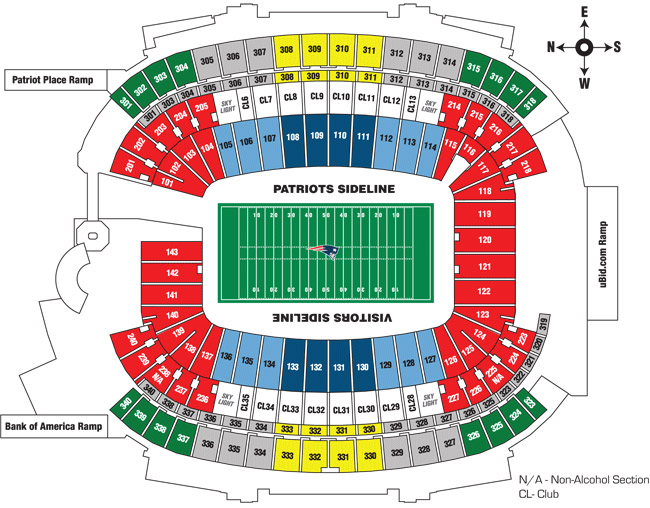
Notable Events & Records
NFL
The venue has hosted the NFL’s nationally televised prime-time season-opening games in 2002, 2004, 2005, 2015, 2017, and 2019 (when the Patriots unveiled their championship banners from Super Bowls XXXVI, XXXVIII, XXXIX, XLIX, LI, and LIII The first NFL game at the stadium was held on September 9, 2002, against the Pittsburgh Steelers, a 30–14 Patriots victory. The stadium’s first playoff game it was held the following year after the 2003 regular season.
Playing in the divisional round against the Tennessee Titans, the Patriots hosted the coldest game ever (4 °F (2 °C), -12 °F (-7 ° C) wind chill) in New England Patriots history The Patriots won 17-14 The stadium also played host to the 2003 AFC Championship Game, in which the Patriots defeated the Indianapolis Colts 24-14.
The Patriots won the first seven playoff games held at the stadium between the 2003 and 2007 seasons, including the 2007 AFC Championship Game, where they beat the San Diego Chargers to improve to 18-0 and advance to Super Bowl XLII. . On January 10, 2010, the Baltimore Ravens beat the Patriots 33–14, giving the Patriots their first playoff home loss at Gillette Stadium. The Patriots suffered their second straight playoff loss at home on January 16, 2011 in a 28–21 victory of the New York Jets.
During the 2011-12 NFL playoffs, the Patriots defeated the Denver Broncos, 45-10, and the stadium hosted their third AFC Championship, where they beat the Baltimore Ravens, 23-20. However, the New York Giants ruined the Patriots’ season by beating them in the Super Bowl for the second time. The following year, they again hosted the AFC Championship game, where they lost 28-13 to the Baltimore Ravens in the final game for Patriots radio host Gil Santos. During the Divisional Round of the 2014-15 NFL playoffs, the Patriots avenged their 2012 loss to the Baltimore Ravens by beating them 35-31.
The following week, they defeated the Indianapolis Colts 45–7 in the 2014 AFC Championship. The stadium hosted its sixth AFC Championship game during the 2016 playoffs when the Patriots defeated the Pittsburgh Steelers 36- 17. The seventh AFC Championship hosted at Gillette Stadium occurred the following year when the Patriots defeated the Jacksonville Jaguars 24-20. In the 2018 season, Gillette Stadium hosted a Divisional Round game, when the Patriots defeated the Los Angeles Chargers by a score of 41-28 en route to winning Super Bowl LIII.
In Tom Brady’s last game as a Patriot, the Tennessee Titans defeated them in the first round of the 2019 playoffs with a 20-13 loss. Entering the 2021 season, the Patriots had an all-time playoff record of 19-4 at the stadium.
Other events
- The AMA Supercross Championship has been racing at Gillette Stadium since 2016.
- Monster Jam has been coming to the stadium since 2014.
Upcoming Events
2026 FIFA World Cup
Gillette Stadium will host multiple matches during the 2026 FIFA World Cup. It is one of eleven US venues selected to host matches during the tournament.
Parking
Parking is plentiful along Route 1 in Foxborough. The best following can be found on the team-owned lots at Patriot Place and directly across from the stadium.

